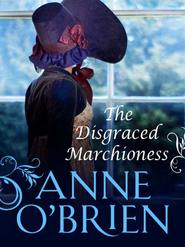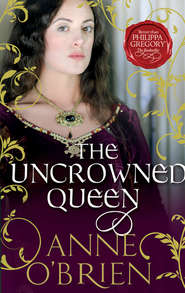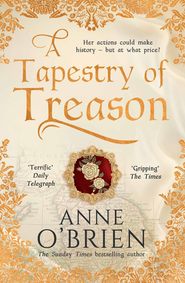По всем вопросам обращайтесь на: info@litportal.ru
(©) 2003-2024.
✖
Conquering Knight, Captive Lady
Настройки чтения
Размер шрифта
Высота строк
Поля
‘And for how long would that be, my lady?’
She lifted her chin an inch, stared down her nose. ‘For as long as I see fit. I intend to make my home here.’
‘As you wish, my lady.’ Sir Thomas turned, to stamp back up the steps, in no way discommoded by the interview.
‘One moment, Sir Thomas. If you please.’
He halted, half-turned, but did not retrace his steps.
‘If you would see to my horses and my baggage, I wish to inspect the private quarters.’
‘As you wish, my lady.’ With bad grace, he marched back down the steps and across the bailey to the thatch-and-timber constructions that housed the kitchens, resentment hovering round him like a swarm of flies in summer. She heard his muttered parting shot.
‘Let me know when you decide you don’t wish to stay, my lady.’
But she would stay. She must. The new Lady of Clifford braced for what was to come.
‘Well, it could be worse. Some improvements have been made.’ Petronilla surveyed the stone walls rising on every side to create an inner court.
‘I fail to see them,’ Rosamund lifted one soft leather boot to inspect the mud caked almost to the ankle. This inner courtyard enclosed within the defences of the stone keep was badly drained and awash with standing water. The walls were high, hemming them in, cutting off the light. The air was dank and chill and would be so, she suspected, even on the warmest of summer days. She shivered within her mantle. ‘It’s like being enclosed in a stone tomb.’
‘At least you have the comfort of a stone hall. Timber lets in the draughts so,’ Petronilla continued, trying to make the best of it. They looked around them at the five towers and the three-storied Hall, all connected by a strong defensive wall, a battlement walk around the top. ‘And our safety here is guaranteed, even if the outer bailey falls to an attack.’
‘Do you say?’ Rosamund poked at some decaying mortar between the stonework. ‘I think we should look at the rest before we go in.’ She followed Sir Thomas’s distant figure down into the bailey.
It did not take long. Rosamund’s sense of disgust deepened with every step. Other than the gatehouse and the keep, both of stone and substantial enough, the rest of the fortification was still the original timber palisade with an outer earth bank and ditch. The buildings in the outer bailey were timber and thatch—stables, kitchens, store rooms, as well as shelters for the scattering of cows and sheep that roamed and mired up the surface. She stepped cautiously around the animals. Should they not be fenced in somewhere? Chickens sat broodily along one roof ridge. In the corner beside the keep, easily recognisable by the rank smell, a midden spread its foul contents underfoot. Her nose wrinkling, Rosamund quickly put distance between herself and the offending heap. Who could have allowed the midden to be positioned there, so close to the habitation?
‘It could be worse,’ the Dowager gulped, as if repeating the words would make them so. ‘You’ve a secure water supply from the well.’
‘So I have.’ Rosamund suddenly smiled wryly at her mother, struck by the sheer awfulness of it all. ‘Stop being so cheerful!’ But this is where she must stay. ‘Let’s go in. You notice that our commander and my invisible steward—if I have one—are both keeping a low profile. I think it bodes ill.’
It did. The sight and the stench reduced the de Longspey women to a silence.
‘Oh, dear!’ Lady Petronilla managed at last.
The Hall showed evidence of hard and crowded living, being the nightly refuge of Sir Thomas’s men-at-arms. Dark in the most sun-filled of days, rank with smoke from the open fire that did not find the intended outlets in the thickness of the wall and with the rancid reek of animal fat feeding the rush lights, it was a scene from a church wall-painting of Hell, to frighten the sinful into a better life on earth.
‘These rushes have not been changed since last winter.’ In awe of such filth, Rosamund tried not to disturb them too much as she walked in, flinching from the fleas and vermin that would infest them. Any sweet scent had long gone, replaced by the stench from putrid scraps of food and worse from the savaging hounds that drew back snarling as she approached. Over all, the whole place reeked of unwashed humanity.
The furniture was minimal, splattered and scarred. A few benches and stools stood by the hearth. The single standing table on the dais had seen better days. There were no tapestries to decorate the walls. Indeed, it would have been a shame to hang them where their beauty would have been spoiled. The stonework ran with wet and soot from the fire.
‘So what about the private chambers?’ Rosamund started up the stairs to the next floor. ‘For where shall we sleep tonight?’
‘Not in here!’ Lady Petronilla lifted the hem of her skirts from the outrage.
The solar, intended as a comfortable refuge for the women of the household, contained nothing but evidence of soldiers sleeping there—a discarded boot and assorted pieces of raiment, jugs of ale, remnants of ruined food. Equally, the adjoining private chamber intended to heighten the authority of the lord and his lady had been taken over, Rosamund presumed, as the haunt of Thomas de Byton, and he had done nothing to remove his presence from it.
‘By the Virgin!’ Rosamund kicked over a pile of questionable material beside what should have been an impressive oak bedstead, then retreated from platters of food with their layers of fuzzy mould. The smell that hit them at the door heralded the existence of the garderobe, built into the thickness of the wall to empty into the ditch below. It was altogether an appalling place.
Rosamund decided not to investigate further. ‘I doubt this has ever been cleaned out since the stone keep was first constructed. It’s hard to believe that Ralph de Morgan would want it.’ She veiled her thoughts with dark lashes from her percipient mother, not liking their direction, unable to dispel the sharp bitterness that settled beneath her breast-bone. ‘As a dower it does not recommend me highly to a husband, does it? And yet Ralph de Morgan would take me, to acquire this. Simply because it controls the crossing of the Wye. The cow byres in Salisbury are better kept than this! Yet it was thought to be a suitable dower for me.’ She heard her voice rise, and strove without success to control the bleak vision of her future here. ‘Perhaps at my advanced age Ralph is the best I can hope for. I clearly have no great value in de Longspey eyes, except to entice a border lord into their clutches.’
‘Foolish girl! How could you think that you have no value! Believe me, Rose, this place will look far better after a good scrub!’ Petronilla managed a semblance of a smile as Edith called on the Virgin to give them succour. Only too well aware of the probable live occupants of the mattress, they made a discreet exit from the chamber. The fleas and bugs might be invisible, but the mice and rats were not. Nor the enormous spiders that had spun cobwebs over every corner.
‘I can think it well enough. Consider this. Earl William and Gilbert thought to attract a husband for me by using this … this midden as a dower. What value does that give me? What worth have I?’ But Rosamund squared her shoulders against the hurt. She would not let it crush her spirits. She could at least pretend that the pain of humiliation in her chest did not exist. ‘Perhaps the storerooms will give me hope.’
They did not. A cursory inspection suggested that Rosamund de Longspey owned nothing but a serious quantity of barrels of ale. A sad fact confirmed by the mid-day meal, served by an ill-washed kitchen boy in the squalor of the Great Hall. The array of dishes comprised, apart from the ale, nothing more than a thick mutton broth, a platter of boiled onions and coarse flat-bread, burnt at the sides.
They did their best with it in a horrified silence that at least gave Rosamund time to marshal her thoughts. She dipped her spoon into the fat that pooled glossily on the surface, pushing aside the gristle before pushing aside the bowl itself. She had three choices as she saw it. To accept defeat, retreat to Salisbury and Ralph’s noxious embrace. The shudder that ran over her flesh at the thought had nothing to do with the ferocious draught that had frozen her feet into splinters of ice. She could not do that. Why, oh, why had the Wild Hawk not agreed to take her? The shiver that rippled over her skin had even less to do with the cold, but a remembered awareness in her belly as his eyes had travelled over her body. It had lingered, a knot of heat, even when he had rejected her with nothing but the briefest of salutes to her fingers. Now to have his hands awaken her body …
Well, he hadn’t wanted her. And as she could not possibly take Ralph, so she must turn her back on marriage.
The second possibility—she let her affectionate gaze rest on the Countess who was in the act of pushing the platter of onions toward Sir Thomas with a gracious and entirely false smile. She could take up residence at Lower Broadheath with her mother and grow old in extreme and graceful boredom.
Or … she inhaled slowly as her eyes travelled round the stained walls of her Great Hall … she could remain here and claim her inheritance as Lady of Clifford.
‘If you wed Ralph de Morgan, you would not have to live here, Rose.’ Petronilla’s advice was tentative, but accurate.
‘Would you give yourself into Ralph de Morgan’s sweaty hands?’
‘No.’ The Countess sighed.
Rosamund had stiffened her shoulders. Despite the impossible horror of it all, she would remain here at Clifford, but there were changes to be made. Immediate and wideranging, and very much to her own liking. She would make this place her own. Was she not the undisputable Lady of Clifford? She remembered smiling serenely at the Countess and a suspicious Sir Thomas.
Now Rosamund scowled.
‘Changes to my own liking?’ she announced, coming to an abrupt halt in her pacing, her recollections overlaid by a bitter truth and a slick layer of dread. ‘What could I have been thinking? Any authority I thought was mine has just been denied me at the point of a sword.’
Just when she had made her decision to stay, to make the best of it, what did she find? That ruffian taking possession of her castle, her dowry, her only protection to stand between herself and Ralph de Morgan. Just when she had come to terms with her new home with all its imperfections, had forced herself to challenge the sneers of Sir Thomas, had accepted the hard work it would take to make it her own, it was snatched out of her hands by this disreputable riff-raff. This oaf!
‘Did you hear what he said? The audacity of that … that plunderer!’ Rosamund rounded on her mother as soon as Petronilla entered the Great Hall.
‘Yes. I could not help but hear it.’ Lady Petronilla looked back over her shoulder, thoughtfully, to the distant figures, the sounds of activity.
‘The castle is his and would I kindly see to the preparation of a meal!’ Rosamund raised her hands, smacked her palms together so that the sound echoed sharply in the high roof-space. ‘I have the documents, the seals of ownership. He can’t do this to me.’
‘I fear that he has.’
Rosamund gnawed at her bottom lip, frowned at her unperturbed parent. ‘You seem very calm with all this.’ Of late the Countess had a tendency to accept the vagaries of life with a lack of spirit, a worrying development, but now was not the time to discuss it. ‘I will not eat with him.’
‘We can’t starve, Rose. Besides, hunger is bad for the temper. You need to be cool here, Rosamund, when you decide what you will do.’ She looked at her daughter’s flushed face. ‘What will you do?’
The green eyes snapped. ‘I have no idea.’
‘Then let us set food before the two knights, as we should with all good manners toward our guests, and see what unfolds.’
Rosamund nodded at the wisdom of her mother’s advice. Otherwise, would she not show herself to be as uncouth as the man who had just held the point of his sword to her breast? But she would not retreat, as he would soon learn. ‘Very well. I will feed him. But mark this. I will not give my home up to some unprincipled Marcher ruffian—whoever he says he is—without a fight.’
‘No, dear Rose. Of course you won’t. But it might not be wise to antagonise him.’











